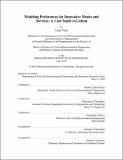Modeling preferences for innovative modes and services : a case study in Lisbon
Author(s)
Yang, Lang, S.M. Massachusetts Institute of Technology
DownloadFull printable version (2.107Mb)
Other Contributors
Massachusetts Institute of Technology. Operations Research Center.
Advisor
Moshe E. Ben-Akiva and Charisma F. Choudhury.
Terms of use
Metadata
Show full item recordAbstract
Increases in car ownership and usage have resulted in serious traffic congestion problems in many large cities worldwide. Innovative travel modes and services can play an important role in improving the efficiency and sustainability of transportation systems. In this study, we evaluate the preferences for some new modes and services (one-way car rental, shared taxi, express minibus, school bus service for park and ride, and congestion pricing) in the context of Lisbon, Portugal using stated preferences (SP) techniques. The survey design is challenging from several aspects. First of all, the large number of existing and innovative modes poses a challenge for the SP design. To simplify choice experiment, sequential approaches are used to divide the large choice set into car-based, public transport, and multimodal groups. Secondly, there is a large set of candidate variables that are likely to affect the mode choices. The findings of focus group discussion are analyzed to identify the key variables. Thirdly, the innovative modes and services are likely to affect not only the mode choices but also the choices of departure time and occupancy (in case of private modes). A multidimensional choice set of travel mode, departure time, and occupancy is considered. Two types of models are used to investigate the preferences and acceptability of innovative modes and services -- nested logit models and mixed logit models. The main attributes in the systematic utilities include natural logarithm of travel time and cost, schedule delay, size variables for unequal departure time intervals, and inertia to revealed preferences (RP) choices of travel mode, departure time, and occupancy. The values of willingness to pay (WTP) are found to depend on trip purpose, market segment, and the magnitude of travel cost and time. Mixed logit models can address complex correlation and heterogeneity problems in the SP data better than nested logit models. Based on the estimation results, mixed logit models are found more efficient and reliable. They can provide important information for transportation planners and policy makers working to achieve sustainable transportation systems in Portugal as well as in other countries.
Description
Thesis (S.M.)--Massachusetts Institute of Technology, Dept. of Civil and Environmental Engineering; and, (S.M.)--Massachusetts Institute of Technology, Sloan School of Management, Operations Research Center, 2010. This electronic version was submitted by the student author. The certified thesis is available in the Institute Archives and Special Collections. Cataloged from student-submitted PDF version of thesis. Includes bibliographical references (p. 150-156).
Date issued
2010Department
Massachusetts Institute of Technology. Department of Civil and Environmental Engineering; Massachusetts Institute of Technology. Operations Research Center; Sloan School of ManagementPublisher
Massachusetts Institute of Technology
Keywords
Civil and Environmental Engineering., Operations Research Center.